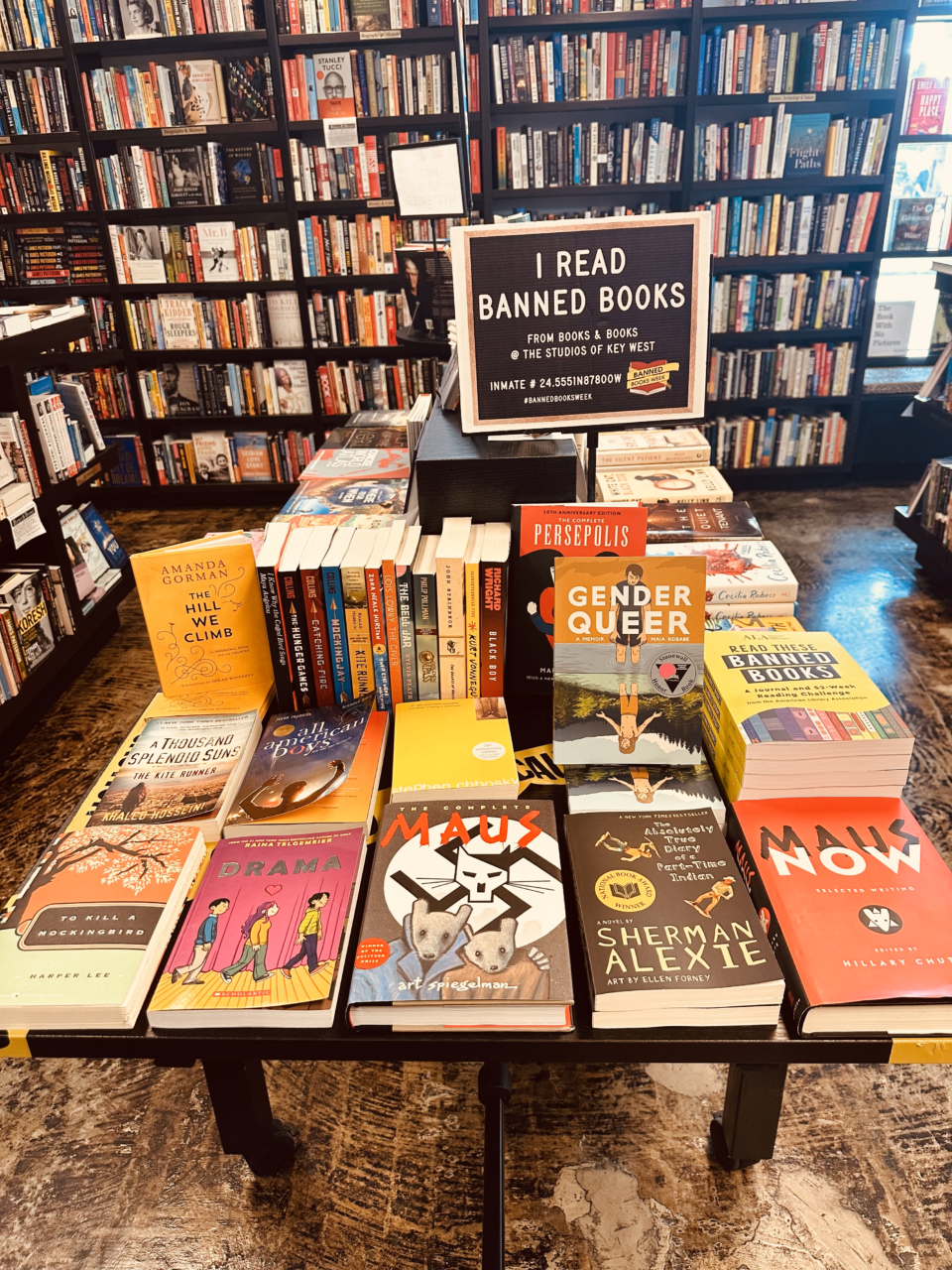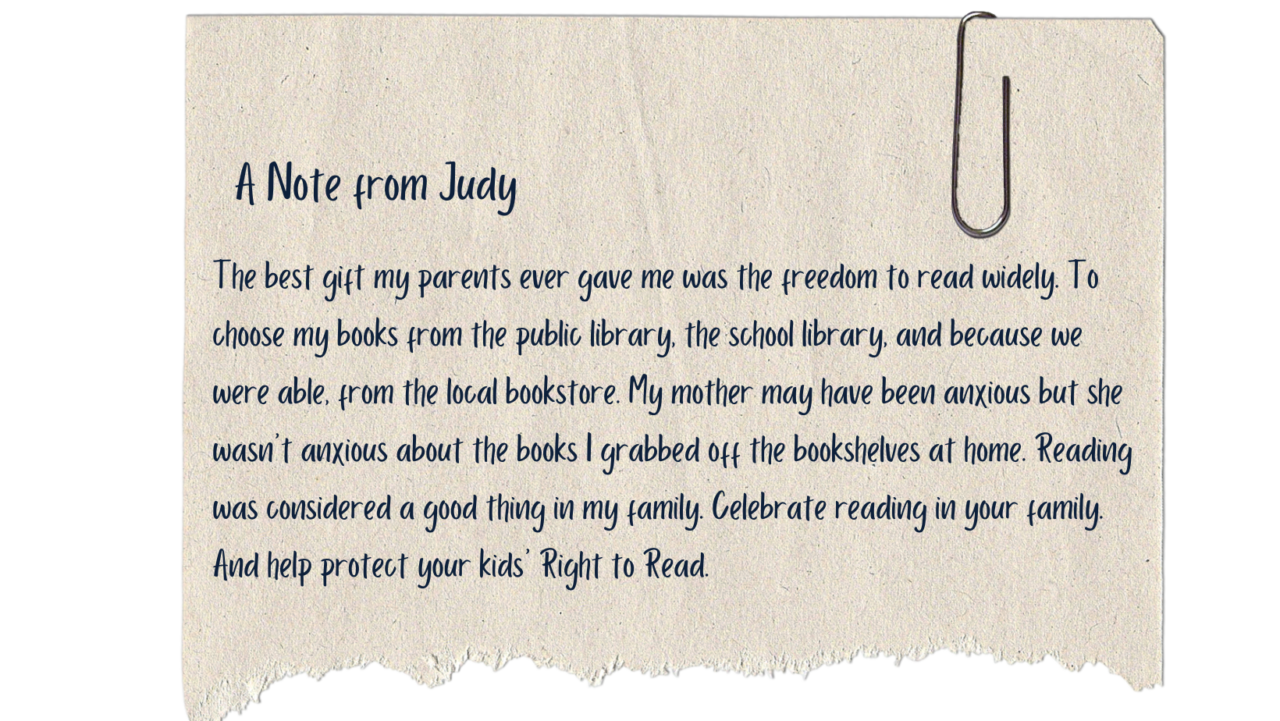Banned Books Week, October 2023

Banned Books Week celebrates the resilience of literature, the fact that often the same books that are challenged and banned are, in other circumstances, recommended, proudly displayed, and most importantly, read and enjoyed.
Not every book is for every reader, but look closely at those who think they should get to decide across-the-board what’s appropriate for everyone. Increased book banning efforts, and new legislation have created an atmosphere that chills. Make no mistake. This is about control – control over what young people can read, learn, and even think. (Although no one can ban thoughts – yet.)
Until recently most book challenges were brought by parents or community members concerned about specific books, but in the last few years book bans have become a state-sponsored agenda in which multiple titles are being challenged at the same time, often cavalierly.
“These efforts to chill speech are part of the ongoing nationwide ‘Ed Scare’ — a campaign to foment anxiety and anger with the goal of suppressing free expression in public education,” write the authors of PEN America’s Banned in the USA report. “As book bans escalate, coupled with the proliferation of legislative efforts to restrict teaching about topics such as race, gender, American history, and LGBTQ+ identities, the freedom to read, learn, and think continues to be undermined for students.”
Book banning is also happening in public libraries. The American Library Association’s Office for Intellectual Freedom documents a record number in the more than 20 years they have been tracking book banning efforts. “ALA recognizes all of the brave authors whose work challenges readers with stories that disrupt the status quo and offer fresh perspectives on tough issues,” said the president of ALA. “Closing our eyes to the reality portrayed in these stories will not make life’s challenges disappear.”

Last year over 40% of all book bans occurred in school districts in Florida. But if you aren’t a K-12 student looking for The Bluest Eye by Toni Morrison, I Am Ruby Bridges, a picture book about Ruby’s life, or any one of thousands of other titles, you might not believe book bans happen here.
They do.
And always, kids are the real losers. The very child who may need a book to find a character just like them, to know they’re not alone, loses that chance. They lose the chance to read widely. They lose the chance to discover, to find out, to question.
What about the teachers and librarians whose jobs are threatened, who can lose their pensions? How do we protect them? The fear is palpable. “I’ve worked 35 years to bring books and young readers together,” a visiting school librarian from another district told us. “And now I can lose my pension if I don’t comply. Well, I’m not going to do it. I’m going to keep standing up for the kids. It’ll be hard if I lose my job and pension but I’ll figure out another way to earn a living.” Another told us, “I just close my classroom door and continue teaching the way I always have, by bringing in the best books I can. And if the day comes when I can’t teach that way, I’ll quit. I hate to lose my pension. I’ve worked long and hard for that. But I’m not going to give in to this craziness.”
But how many can afford to say that?
What about here in Key West?
Key West is not Florida. This is commonly heard among those of us living in the Keys, especially in Key West. We feel isolated not only geographically but also politically from anything we find alarming on the mainland. Life can be good in the Key West bubble but it’s important to not lose track of what’s happening in our own back yard.
We understand that during the past summer recess, media specialists in the district were required to go through their school libraries to determine that all materials were in compliance with new, and stricter, state and district guidelines. The outcome of that process is unclear. We have had sharply conflicting reports from parents, teachers and administrators. We doubt that we have seen an end to this process. But whatever is happening, this is exactly why we all should be paying attention. Don’t rest on the assumption that book bans aren’t happening where you live.
Here’s what you can do:
- If you have a child in a public school ask them what they’re reading in school and if they get to visit the media center regularly.
- Check out the online catalogs of schools in your district (most are posted publicly on the school’s website. In Florida they’re required to make media center catalogs open to the community). If a book from a banned books list appears available don’t stop there. Do what you can to make sure it’s actually on the shelf and available to students.
- Check to make sure new books are available. Counties are able to “ban by omission.” Though books may not have been pulled, ask about titles they’re choosing not to include in the school library.
Teachers and media specialists need and deserve our support in standing up for their students and their right to read, even those books that make some uncomfortable. Any one book could be the key that saves a young person’s life. The threats to these educators have escalated – their jobs are at stake, their pensions could be lost, and felony charges can be brought against them. It’s a nightmare, as one teacher said.
Many of the things we are doing in store for Banned Books Week are fun – we’ll have Banned Books Bingo cards, a special bookmark, stickers, and interesting and informative displays – but we also hope you’ll think about what would be missing in your life if you couldn’t pick up and read the books of your choice.
So speak out! You’re not alone. There are groups and organizations who can help you whether you’re a teacher, librarian, parent, student, or a reader who cares about others having free access to books and learning. You’re busy. We know that. But if you read just one of these websites and if you can become a member, you’re helping.
- National Coalition Against Censorship’s Kids’ Right to Read Project
- Learn more and get involved with PEN America’s Free the Books
- In Florida, check out the Florida Freedom to Read Project
- UniteAgainstBooksBans.org: This grassroots anti-censorship campaign has social media tools to show your support, background information, and resources on how to oppose book banning locally.
